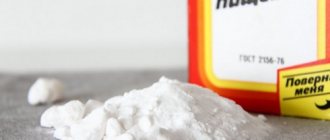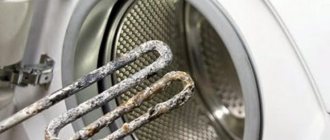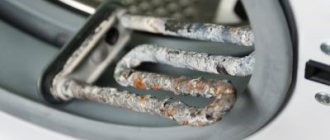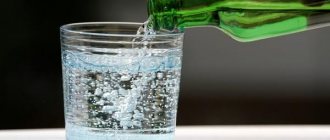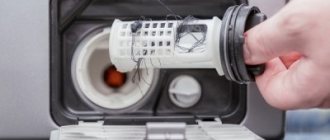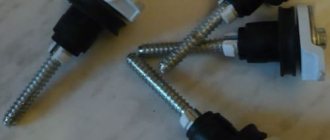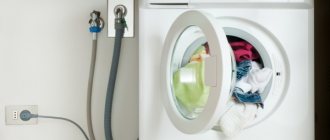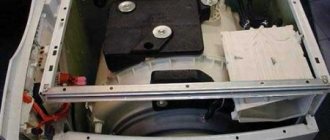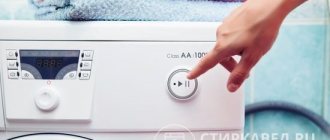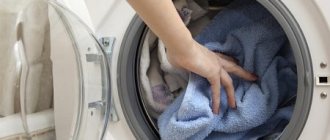Why do you need to clean your washing machine?
During long-term operation of the device, dirty deposits accumulate on the surface of plastic and metal parts.
This is a favorable environment for the development of bacteria and fungi, which are sources of unpleasant odors. Experts cite the following as the main causes of unwanted formations on the internal parts of the washing machine:
- hard water from city water supply systems;
- low-quality washing powders, gels, conditioners;
- Frequent operation of the device on intensive washing programs.
Water used for washing often contains large amounts of oxides, calcium and magnesium salts. Under the influence of temperature, they settle in the form of a solid deposit (scale), mainly on the heating element and drum. If you do not take any action, the device will begin to wear out due to accumulated plaque and dirt. This will undoubtedly affect the service life of the unit.
If you take the necessary measures in time, you can avoid repairs and extend the life of your household appliances. Today, there are many effective and budgetary means for these purposes.
How to use citric acid
You can descale your washing machine only in the idle washing mode. Before you begin the procedure, you need to make sure that there is nothing in the drum, and also check that there are no buttons, coins or other small parts under the rubber gaskets that could damage the drum while the machine is running. Damaged elements will further tear the clothes loaded for washing.
Lemon juice cannot replace the acid in the powder because it has a much lower concentration of the active substance
Citric acid is a strong agent, so you should use it with caution when cleaning your washing machine. To prevent damage to plastic and rubber parts, recommended dosages should not be exceeded. How much citric acid should I use to get rid of scale? If the “home helper” is designed for 5-6 kg of laundry, you need to take 200 grams of the substance; for 3-4 kg, 100 grams is enough.
Cleaning a washing machine from scale with citric acid is simple: pour the product into the powder compartment and turn on the longest washing mode at a temperature of 60 ℃ and above. Under the influence of temperature, the acid will dissolve deposits on the heating element and other parts, and the machine will rinse them out along with water.
Citric acid should be poured into the washing powder compartment
During the cleaning process, you need to listen to the sounds that accompany the operation of the equipment. It happens that large pieces of lime get stuck in filters or drain hoses. In this case, the car hums louder. To avoid overload, you need to stop the streaking, unscrew the drain hose, open the filter and remove stuck pieces of plaque. Then return everything to its place and start the wash further.
After the cycle is completed, check to see if there are any pieces of plaque or lime remaining in the drum or under the rubber pads. Residues must be removed so that they do not damage the drum and clothes during the next wash. They also check the drain of the washing machine.
How often should I descale? If the machine has been in operation for several years, and during this time it has never been cleaned, you can safely begin processing. Then it is enough to repeat the procedure once every 6-12 months, depending on the hardness of the water.
If you doubt whether your equipment needs cleaning, you can try to inspect the internal elements of the washing machine yourself, without calling a technician. The heating element is usually located directly under the drum, and with the help of an ordinary flashlight, with a little patience, the heating element can be examined without disassembling the machine.
Is it possible to clean a washing machine with citric acid?
Often users of modern household washing equipment ask a similar question. After all, today there is a large selection of special products on store shelves. But if you study their composition, then for the most part the main component is that same citric acid. The only difference is the price and the presence of instructions on the packaging on how to properly clean an automatic washing machine with a citric acid-based product. Therefore the answer is obvious. The concentrate in question is suitable for such events. The main thing is to follow the dosage.
Advantages and disadvantages of citric acid
Why this particular means and not some other? The method of descaling a washing machine with citric acid has its pros and cons. The obvious advantages are:
- Availability - citric acid is sold everywhere and is quite inexpensive compared to professional products (which, by the way, also contain citric acid as one of the main components).
- Safety - after citric acid there is no residue or odor left in the machine, which could affect the quality of the laundry during subsequent washes.
- Efficiency - this powder really perfectly dissolves even petrified lime build-up on the parts of an automatic machine.
Additional bonuses include the fact that the insides of the washing machine will at the same time get rid of the unpleasant odor, and the window will become transparent and shining. What are the disadvantages? There are none if you do not abuse this product and do not violate the instructions for descaling your washing machine using citric acid.
Of course, these instructions were not compiled by the manufacturer of household appliances, but by the people. But the more reliable and proven it is.
Why citric acid?
Due to its properties, this universal substance with a crystalline structure is actively used by consumers for household needs, including for cleaning lime deposits and fungus from the working elements of automatic machines. This popularity is due to the following advantages:
- the food concentrate successfully copes with unpleasant odors, mold and scale deposits on the parts of the device;
- this is a universal and cheap product that is easy to use for cleaning household appliances;
- When used correctly, it does not have a negative effect on humans or the internal parts of the unit.
Judging by the reviews, this method of cleaning a washing machine with citric acid can effectively combat even thick and long-standing limescale deposits.
Lemon substitutes
Are there any other products that fight scale as effectively as citric acid? Today on store shelves you can find many compounds with a similar spectrum of action, most of which can be easily combined under the general name “Antinakipin”. You need to use household chemicals to wash your washing machine, following the instructions provided on the product packaging.
It is imperative to follow the dosage and procedure for using the special anti-scale composition; if you “overdo it” with the product, you can cause enormous damage to the automatic machine, causing a breakdown.
Many people are wondering whether it is permissible to replace lemon powder with freshly squeezed lemon juice. You shouldn’t do this; you won’t be able to achieve the desired effect, because the acid concentration in the fruit is much lower. It is also not recommended to use vinegar instead of lemon juice, as it can damage individual parts of the machine.
Some users clean their washing machine in a non-standard way - using Coca-Cola. In this case, you need to pour 3 liters of drink into the drum and run a washing program with water heating to 60°C. There will be no trace of scale left.
To ensure that the layer of plaque on the internal parts of the washing machine is not critical, it is important to follow several rules when using the machine. Experts advise:
- Use water softeners if the water is too hard. Some powders for automatic machines already have water softening components added;
- do not exceed the dosage of detergents recommended by the manufacturer;
- Do not machine wash old items. Scraps of fabric will settle on parts of the machine, forming a coating;
- choose washing programs that provide water heating of no more than 75°C;
- Be sure to ventilate the machine after the end of the cycle. You should leave the hatch door open; it is better to pull out the powder receptacle and dry it. Wipe the surface of the drum with a dry cloth.
So, rinsing the inside of the machine with citric acid is very simple. It is necessary to pour the required amount of grams of lemon into the powder receptacle and start the program. The washer will do the rest on its own. Observe the frequency of cleaning the machine so that the scale layer does not become critical. It is also important to properly care for your “home assistant” to prevent the formation of plaque.
Interesting:
- Cleaning a washing machine with citric acid - reviews
- Cleaning the washing machine with citric acid
- How to clean an Ariston washing machine?
- Cleaning the washing machine with soda ash
- Cleaning a Samsung washing machine from dirt
- At what temperature should you clean your washing machine...
Reader comments
- Share your opinion - leave a comment
Cleaning the washing machine with citric acid: recommendations for use
Despite the fact that the product in question is an acid, when used correctly it does not harm the internal parts of the automatic machine. In addition, many housewives consider citric acid to be the most effective budgetary remedy in the fight against scale and dirt in an automatic washing machine.
How much citric acid to use when cleaning a washing machine
The correct dosage is the main condition for a successful procedure. The calculation should be 15 g per 1 kg. That is, if the drum is designed for a load of 4 kg, 60 g of food concentrate will be required for cleaning, which is 3-4 tablespoons.
Procedure technology and precautions
Before cleaning the washing machine with citric acid, you must remove all items from the drum. Cleaning occurs without laundry.
The frequency of the procedure depends on the degree of use of the device. If washing with the machine is carried out 4-5 times a week, or the “intensive” mode is often used, it is recommended to clean the machine once a quarter. If less often - once every six months.
Important!
After the cleaning process is completed, be sure to remove and wash the drain filter from any remaining deposits, and the powder compartment from the cleaning agent.
Pros and cons of cleaning with citric acid
The properties of citric acid are determined by its chemical structure. This substance was not invented specifically for cleaning washing machines, so its effect on equipment parts has both positive and negative sides.
Positive aspects of the method
Without cleaning the scale in the SM, you can expect, at a minimum, burnout and the need to replace the heating element. Therefore, there is no need to delay the cleaning procedure. The method for removing deposits should allow anyone without experience to carry out the procedure.
If you decide to regularly clean your SM with citric acid, you can buy a large volume of it at once. It will be cheaper and less troublesome
The use of citric acid to eliminate accumulated insoluble salts meets this requirement due to a number of advantages:
- Availability and low cost . Citric acid in the required quantity can be bought in any store for several tens of rubles.
- Simplicity . Even an untrained person can carry out the cleaning procedure.
- Efficiency . 100 g of citric acid will dissolve up to 80 g of scale.
- Safety . Both citric acid and calcium citrate formed after dissolving scale are harmless to health.
These positive aspects of LC make it the drug of choice in the fight against scale. There is no point in buying expensive special products for cleaning SM if they provide a similar effect.
Citric acid is used both in caring for the internal and external parts of the washing machine. The advantage of this folk remedy is that using lemon juice can effectively clean surfaces that are inaccessible to the user.
Confirmation of the effectiveness of removing accumulations with citric acid is demonstrated in the video:
Negative effects of citric acid
There are legends about the negative effect of citric acid on internal parts when cleaning a washing machine. Numerous arguments are given against this method, but little evidence is provided.
The theoretical claims of people regarding cleaning SM with citric acid are:
- The formation of salts that remain in the washing machine and can clog the drain.
- The acid corrodes the metal components of the heating element.
- Rubber seals soften and may crack.
- After cleaning, things develop a specific smell.
To remove scale from the SM, a 1% solution of citric acid is used.
For comparison, a 10% solution of aggressive hydrochloric acid is used to clean water heating boilers from deposits. And even multiple treatments with such a strong agent do not affect the operation of the equipment. And rubber is generally resistant to short-term exposure to weak acids.
The problem will arise if crystals or citric acid solution remain in the pocket of the rubber seal that seals the door. In other cases, the negative effect of citric acid on the insides of the washing machine is a myth.
Holes in the cuff from citric acid do not appear immediately, but only after multiple descaling sessions without following basic rules
The salts formed during descaling, together with the remaining lacquer, are completely removed by subsequent two or three rinses, leaving neither odor nor sediment.
Are all the disadvantages of citric acid really far-fetched? No, descaling has one more drawback, but it is common to all cleaning products.
Insoluble salts can accumulate at water leaks, temporarily closing the hole and eliminating the problem. After cleaning the washing machine, the leak may appear again. The described problem is not caused by citric acid or other means, but you should be aware of the possibility of its occurrence.
The consequences of using LC for cleaning SM are presented in the video:
How to clean a washing machine with citric acid from scale, odor and mold: instructions
To get rid of known plaque, unpleasant odors and mold, it is recommended to proceed as follows:
- Pour the prepared product into the powder dispenser (main wash compartment).
- Select a program that allows washing at maximum temperature.
- Then activate the extra rinse mode.
- At the end of the procedure, the plastic powder dispenser should be rinsed under running water (if it is removable) or wiped with a damp and then dry cloth.
- It is also recommended to wipe the drum dry with a soft cloth and check the cuff of the machine for scale and cleaning agent residues.
After the process of cleaning the washer with citric acid is completed, the device can be immediately used for its intended purpose.
Possible harm to the machine
Citric acid can be harmful only if the dosage and temperature conditions are not observed. If you pour too much of it and set the program to 90 degrees, cleaning will negatively affect the condition of the rubber parts: the seal on the door, seals on the bearings, pipes near the pump, etc. The rubber will lose elasticity, begin to crack and crumble, which threatens water leakage and serious damage to the washing machine.
We recommend: Why is water consumption in a washing machine so important and how to measure it?
Also, damage can be caused to things if you do not remove them from the machine when cleaning or combine the procedure with regular washing. Citric acid steals the color from bright fabrics, they become dull and cannot be restored.
How to clean a drum with citric acid
To descale the tank and drum, follow these instructions:
- The cleaning agent concentrate is placed directly into the drum. For one procedure, 100 g is enough.
- The device is set to perform a washing mode that provides a temperature of at least 60°C.
- 10-15 minutes after the start of the program (when the heating element heats the water), the device is paused, and after an hour of “soaking” the program starts again.
- At the end of the program, it is recommended to run an additional rinse cycle.
- After cleaning, the drum and cuff are wiped with a dry soft cloth.
Important!
Do not use the concentrate more often than once every 2-3 months or exceed the dosage - this may adversely affect the cuff or plastic parts of the washing machine.
Citric acid against rust
Traces of rust on a washing machine can appear not only on the body, but also inside; a brown coating is often found in the detergent compartment. This happens when operating conditions are violated or mechanical stress is applied to structural elements. Over time, the protective coating on the drum is also subject to abrasion, which causes red stripes and spots to appear on the inner surface. In such cases, citric acid can also save you from rust.
The cleaning principle is similar to the method of descaling a washing machine: the required amount of product is poured into the compartment, then an intensive washing mode is started at high temperatures with an idle drum. Then the internal parts of the equipment are wiped with a clean cloth and ventilated.
